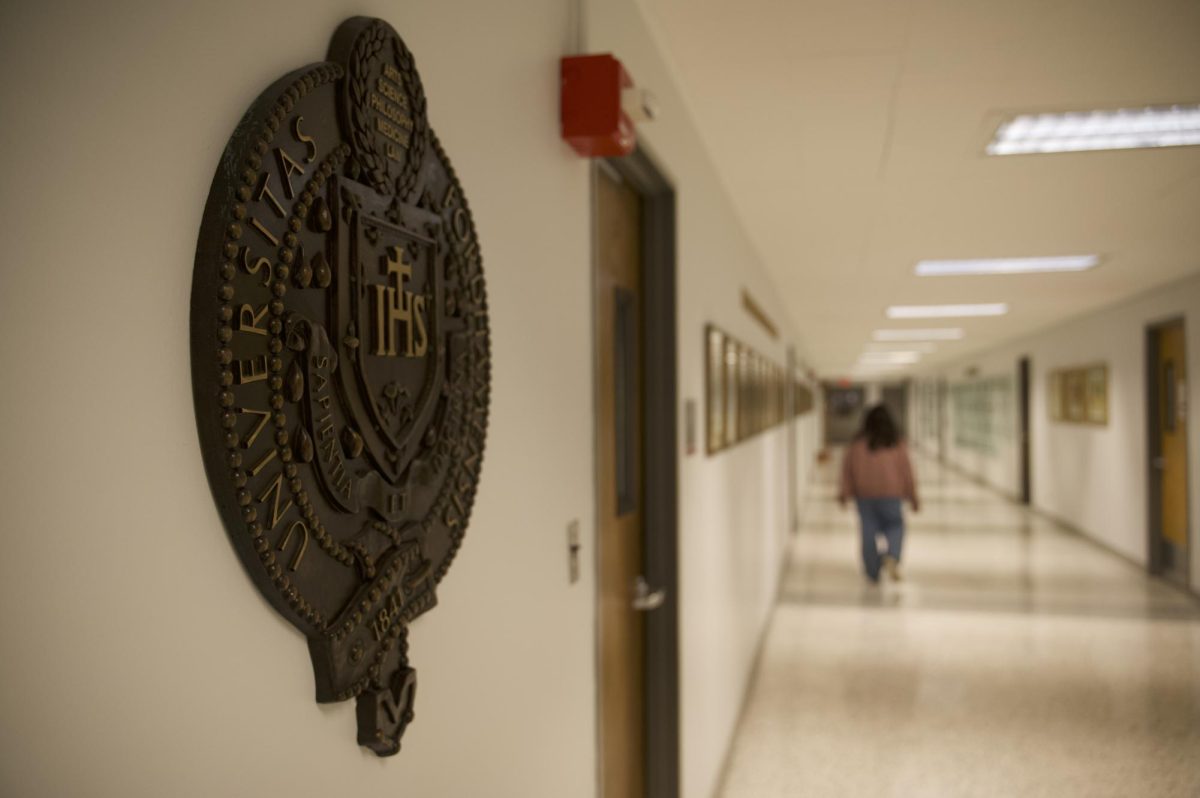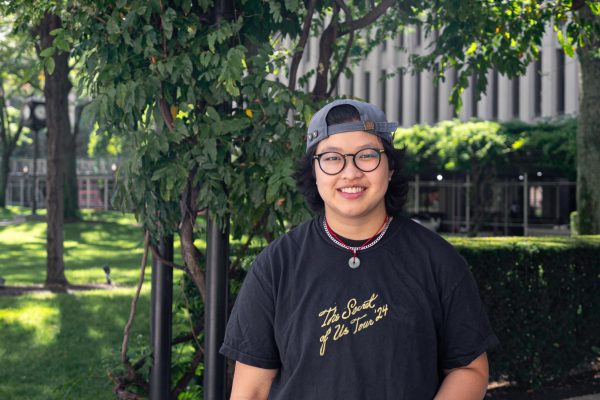Some faculty criticized a proposal for a new core curriculum as a betrayal of Fordham’s commitment to providing a Jesuit education.
While some members of the Fordham community celebrated the freedoms that accompany fewer core requirements for students, others warned that the proposed curriculum could deprive students of the foundational knowledge needed to develop critical thinking, self-awareness and a deeper understanding of the human experience.
Rev. Christopher Cullen, S.J., associate professor of philosophy, expressed grave concerns about the proposed curriculum.
“This is a real crisis moment for Fordham,” Cullen said. “I really think if we go the way of the current proposal, we are going to be losing our rootedness in the Jesuit and Catholic traditions and liberal arts tradition.”
Rev. Mark Burke, S.J., who, like Cullen, is also a philosophy professor, added that “if an institution cannot manifest anything like a Catholic identity in its curriculum, it cannot reasonably consider itself to be Jesuit.”
“There is nothing in the new core curriculum that has any particular orientation towards Catholicism. I do not believe that you can have a Jesuit university that does not take Catholicism seriously in its curriculum.” Rev. Mark Burke, S.J.
The proposal halves theology and philosophy course requirements and requires students to only take one language or linguistics course, among other notable reductions. Cullen said that these disciplines are necessary to “empower students and give them the keys to understand their own world.” Burke reinforced Cullen’s concern, noting that the new curriculum lacks a Catholic framework.
“There is nothing in the new core curriculum that has any particular orientation towards Catholicism,” Burke said. “I do not believe that you can have a Jesuit university that does not take Catholicism seriously in its curriculum.”
Theology professor Aristotle Papanikolaou said exposure to religious ideas gives students a deeper understanding of the world around them, leading them to be more empathetic and “a better citizen of the world.”
“People are perceiving these religious traditions in public life in such a way that might be misconstrued because they don’t really know anything about religion,” Papanikolaou said. “All of that, I think, is dangerous. It leads to preconceptions and prejudices and discrimination, but it’s not really dealing with the world in a way that is informed.”
The primary goals of the new curriculum are to lessen the number of required courses, allow for more student exploration, and make it easier for transfer students to integrate into the university, all while maintaining the Jesuit mission. Stephen Grimm, professor of philosophy and Philosophy Department Chair, said that despite the curriculum changes, the university remains committed to its Jesuit foundations.
“The core of a Jesuit education is to help students to reflect on the deepest questions of life and questions about meaning and purpose and value, and that’s the hallmark of a Jesuit education,” Grimm said.
“There’s excitement in our department about that revision because there’s the possibility of teaching in more interdisciplinary ways and doing what I think is true to the Jesuit value of finding God in all things.” Robert Davis, Assistant Professor of Historical Theology
The new core also features a greater emphasis on interdisciplinary studies, which Cullen argued would not be sufficiently grounded in key subjects in the liberal arts, philosophy and theological studies. He referenced one of the proposed interdisciplinary thematic sequences, “Justice and the Common Good,” a four-course, interdepartmental requirement. He emphasized that a foundation in normative ethics is essential for students to critically understand how justice and virtue are defined before they can engage in applied ethical discussions.
“Before you start doing applied ethics, you need to be grounded in the standard range of ethical theories that are currently discussed and practiced,” Cullen said.
Robert Davis, assistant professor of Historical Theology, said the interdisciplinary approach may be a positive for theology at Fordham.
“There’s excitement in our department about that revision because there’s the possibility of teaching in more interdisciplinary ways and doing what I think is true to the Jesuit value of finding God in all things,” Davis said.
Davis continued that religion is inherently interdisciplinary.
“What we want to preserve is the contribution that theology as a discipline makes to the humanities and to knowledge as a whole,” Davis said.
Cullen also expressed concern over the faculty’s ability to adapt to the new interdisciplinary approach, as he said that core courses are “not going to be explicitly tied to a department.” He questioned how professors will be assigned to teach courses and added that he does not feel qualified to teach certain subjects.
Grimm, on the other hand, is confident that professors under the new core will still teach according to their strengths.
“Anybody who teaches those courses is going to need real expertise in philosophy and theology, for instance,” Grimm said.
Davis noted that the true test of the Core’s commitment to preserving the Jesuit tradition will be seen in its application.
“I think it comes down to how it’s implemented,” Davis said. “The question is more about doing interdisciplinarity in a way…that doesn’t throw out the skills and the wisdom that is gained from working within a disciplinary tradition.”
Cullen also lauded the current core curriculum’s ability to foster an intellectual community, as both the philosophy and theology departments require certain texts for all students.
“I can walk into that classroom and I know that every person is grounded in Kant’s ethics…and it’s amazing,” Cullen said.
“In a world where both philosophy and theology are so deeply needed, but becoming increasingly undervalued as we become a more individualist, materialist culture. I think that we risk losing a sense of ourself as a Jesuit institution by getting away from that.” William Hogue, History Professor and PhD Candidate
Cullen said this community is a defining strength of Fordham and would dissolve under the new curriculum.
“What would be lost would be that sort of commonality, the community that is built by it, but also the grounding in the culture and civilization that has formed us and has shaped our world,” Cullen said.
For William Hogue, a history professor and PhD candidate, the proposed reduction of philosophy and theology reflects a broader shift away from the Jesuit value of care for the whole person, or cura personalis.
“In a world where both philosophy and theology are so deeply needed, but becoming increasingly undervalued as we become a more individualist, materialist culture” Hogue said. “I think that we risk losing a sense of ourself as a Jesuit institution by getting away from that.”
Finding a balance between preserving the Jesuit tradition and addressing the evolving priorities of degree-seeking students will not be able to fully satisfy everyone, Christopher Dietrich, former chair of the Core Curriculum Committee and co-chair of the Phase 2 Revision Committee, said.
“I think that the core revision phase two committee has worked really hard to both decrease the size of the core while preserving the uniqueness of the Jesuit educational mission,” Dietrich said.
A key point of contention surrounding the new core is whether it will continue to inspire students to pursue courses that they might not expect to enjoy, specifically in the realm of philosophy and theology.
“Education is about surprise,” Papanikolaou said. “I’ve seen it too many times that when people go to courses where they’re not really expecting much and wish they didn’t have to take, they get totally surprised how much they like it.”
The Theology department in particular benefits from the core, as Davis said that many students switch into theology majors or minors after taking some of the required courses the department offers. Davis remains optimistic that the new core will allow for that same exploration.
“There’s concern about ‘will students find their way to theology?’ I hope that college remains a space of exploration where people can be surprised to realize that they care about something they didn’t know they did before,” Davis said.
As the committee moves towards the third phase of revising the core, faculty will pay attention to how these changes are implemented — particularly in ensuring that philosophy and theology remain accessible and that faculty expertise aligns with the new curriculum. The impact of the core will ultimately be defined not just by its structure, but by how it is put into practice.


